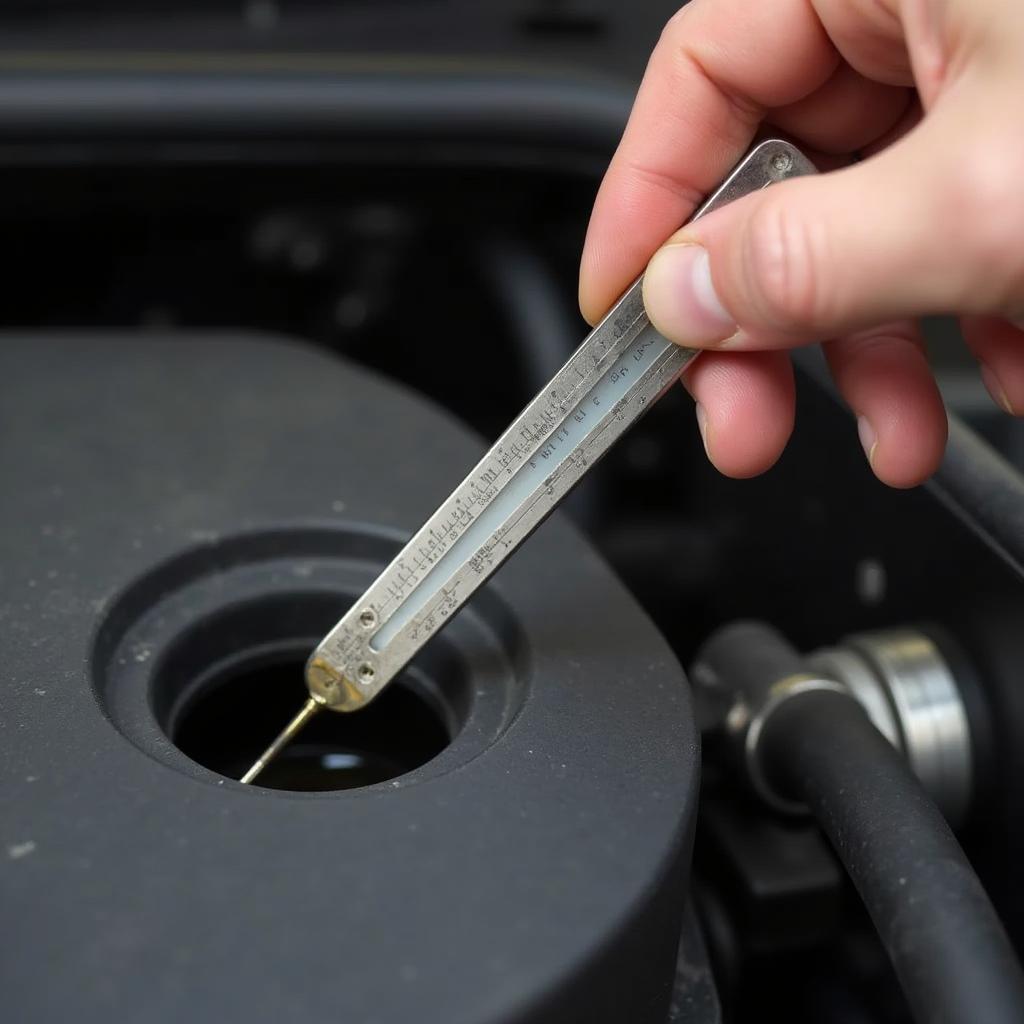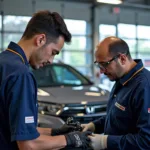Knowing what to look for while servicing a car can save you money and ensure your vehicle runs smoothly for years to come. Whether you’re taking your car to a professional or doing some DIY maintenance, understanding the key areas to check is crucial. This guide will walk you through everything you need to know about car servicing, from the basics to more advanced checks.
Essential Checks During a Car Service
Regular car servicing is more than just an oil change. It’s a comprehensive check-up that addresses various components, ensuring optimal performance and safety. Here’s a breakdown of what to look for while servicing a car:
- Fluids: Check all fluid levels, including engine oil, coolant, brake fluid, power steering fluid, and transmission fluid. Low levels can indicate leaks or other issues. Look for discoloration or unusual consistency, which could signal contamination or degradation.
- Filters: Inspect the air filter, cabin air filter, and oil filter. Dirty filters can restrict airflow and reduce engine efficiency.
- Belts and Hoses: Examine belts and hoses for cracks, wear, and tear. A worn belt can snap, leading to significant engine problems.
- Brakes: Check brake pads and rotors for wear and tear. Thin brake pads can compromise stopping power.
- Tires: Inspect tire pressure and tread depth. Properly inflated tires improve fuel efficiency and handling.
- Lights: Ensure all lights are functioning correctly, including headlights, taillights, brake lights, and turn signals.
Understanding Your Car’s Service Schedule
Each car has a recommended service schedule outlined in the owner’s manual. Following this schedule is vital for maintaining your car’s warranty and ensuring its longevity. These schedules are based on mileage and time intervals, so be sure to adhere to both. Regular servicing can prevent costly repairs down the road by catching potential problems early.
Why Regular Servicing is Important
Regular car servicing not only keeps your car running smoothly but also increases its resale value. A well-maintained car is more attractive to potential buyers, giving you an edge in the used car market. Furthermore, regular servicing ensures your safety on the road by addressing potential mechanical issues before they become dangerous.
DIY Car Servicing: What You Can Do at Home
While some car maintenance tasks require professional expertise, there are several things you can do at home. Checking fluid levels, tire pressure, and lights are simple tasks that can be performed regularly. By taking these proactive steps, you can stay on top of your car’s maintenance and potentially identify issues before they escalate.
Tips for DIY Car Maintenance
- Invest in a good quality toolkit: Having the right tools makes DIY maintenance easier and more efficient.
- Consult your owner’s manual: Your owner’s manual is your go-to resource for specific maintenance instructions for your car model.
- Know your limits: If you’re unsure about a particular task, it’s always best to consult a professional.
“Regularly checking your tire pressure is one of the easiest and most effective ways to improve fuel efficiency and extend the life of your tires,” says John Smith, Automotive Engineer at CarTech Solutions.
Conclusion
Understanding what to look for while servicing a car is essential for every car owner. By following the tips and guidelines outlined in this article, you can ensure your car stays in top condition, maximizing its performance, longevity, and resale value. Remember, regular car servicing is an investment in your vehicle’s health and your safety on the road. What to look for while servicing a car should no longer be a mystery.
FAQ
- How often should I service my car? Consult your owner’s manual for the recommended service intervals.
- What is included in a basic car service? A basic service typically includes an oil change, filter replacement, and a general inspection.
- Can I service my car myself? Some maintenance tasks can be performed at home, but more complex repairs should be handled by a professional.
- How much does a car service cost? The cost of a car service varies depending on the type of service and the make and model of your car.
- What are the signs my car needs servicing? Unusual noises, leaks, warning lights, and changes in performance can indicate your car needs servicing.
- What is the difference between a major and minor service? A minor service usually covers essential checks and fluid top-ups, while a major service is a more comprehensive check-up.
- How can I find a reputable car service center? Ask for recommendations from friends and family or check online reviews.
“Ignoring regular maintenance can lead to costly repairs down the line. Preventive maintenance is always the best approach,” advises Sarah Johnson, Lead Mechanic at AutoCare Experts.
For further assistance, please contact us via WhatsApp: +1(641)206-8880, Email: [email protected]. We have a 24/7 customer support team.


